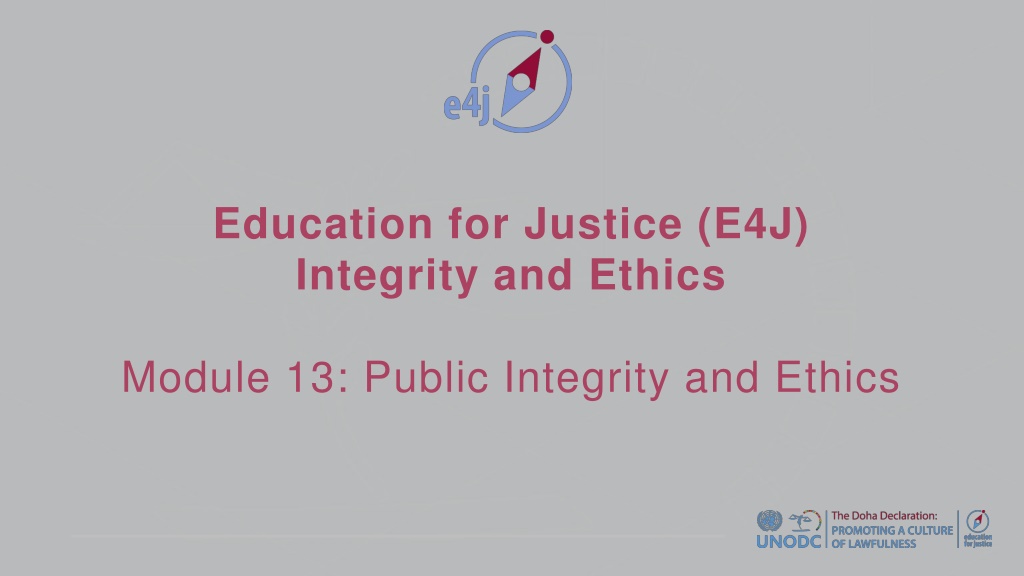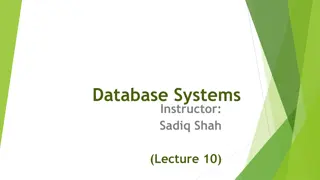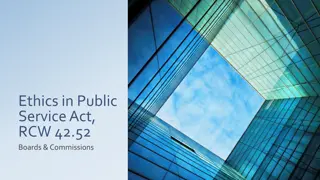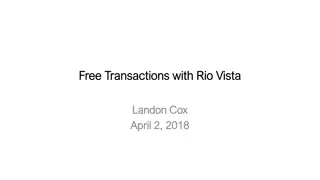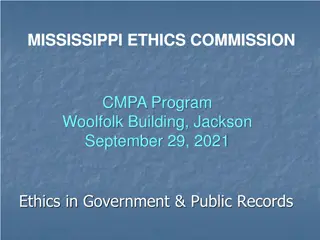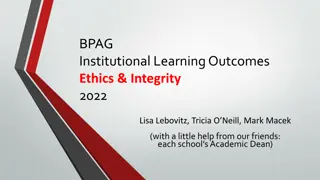Exploring Public Integrity and Ethics in Civil Service
This module on public integrity and ethics delves into key instruments for strengthening ethical practices in public organizations, challenges faced, analyzing codes of ethics, and managing integrity risks. The agenda includes activities like structured ethical reflection, understanding public values, and obligations of public servants. Learning outcomes focus on enhancing understanding of integrity management and ethics in public service scenarios.
Download Presentation

Please find below an Image/Link to download the presentation.
The content on the website is provided AS IS for your information and personal use only. It may not be sold, licensed, or shared on other websites without obtaining consent from the author. Download presentation by click this link. If you encounter any issues during the download, it is possible that the publisher has removed the file from their server.
E N D
Presentation Transcript
Education for Justice (E4J) Integrity and Ethics Module 13: Public Integrity and Ethics
Agenda Ice-breaker: opening reception on values (10 minutes) Civil servant as a temporary steward (10 minutes) Ethics Codes for Public Servants (30 minutes) Public integrity (40 minutes) Structured ethical reflection of case study (20 minutes) Strengthening public ethics and integrity (40 minutes) Obligations of public servants (30 minutes) Optional closing exercise if time allows: reception on public values
Learning Outcomes Upon completion of this module students should be able to: Understand the key instruments for strengthening public integrity and ethics and the processes of integrity management in public organizations Appreciate the challenges involved in strengthening integrity and ethics in the public service Analyse codes of ethics as specific sets of public values and action principles, and understand the interdependence of the values Evaluate and analyse public service scenarios and understand how to identify and manage the risk of integrity breaches
Ice-breaker: opening reception on values Ethicsis the attempt to arrive at an understanding of the nature of human values, of how we ought to live, and of what constitutes right conduct Public ethics: an attempt to find guidance for the right conduct in public service Identity view of integrity: acting in a way that reflects your sense of who you are Public integrity: the powers and resources entrusted to PA, and its organizations, are used effectively according to democratic principles and decisions on public purpose Integrity management: refers to a systemic approach to develop ethical and effective public sector organizations and a healthy organizational climate that supports adequate operation
Exercise 1 Reception on values
Public Service Core Values and Action Principles (Table 1) Value 1 - Accountability Value 3 - Justice and fairness Action principles: Action principles: Reject incompetence Seek efficiency Seek effectiveness Take responsibility for what is done and how Facilitate transparency Listen and be responsive Comply with law Seek procedural and substantive justice Seek fair distribution of public benefits Value 4 - Avoiding doing harm Action principles: Value 2 - Impartiality Provide remedy or relief Use moral imagination Action principles: Avoid conflict of interest Seek inclusion Be objective Pursue the public interest Value 5 - Do good Action principles: Employ empathy Give affirmative help
Ethics Codes for Public Servants Purpose of Codes of Ethics Selection of the topics in a Code Succesfull implementation of Code Enforcement and accountability for integrity breaches International standards for Codes of Ethics
Exercise 2 Ethics Codes for Public Servants
Public integrity Exercise 3: Just Do Your Job
Exercise 4: Case Study I Structured ethical reflection
Strengthening public ethics and integrity Instruments for building ethical environment: Oath Induction training Code of ethics Dilemma discussion Discussion of new rules Internal policy workshops
Exercise 4: Case Study II Obligations of public servants
Core reading: Eagleman, David (2016). How I decide? In The Brain: The Story of You. Edinburgh: Canongate Books Gilman, Stuart C. (2005). Ethics Codes and Codes of Conduct as Tools for Promoting an Ethical and Professional Public Service: Comparative Successes and Lessons. World Bank. Available from https://www.oecd.org/mena/governance/35521418.pdf Lewis, Carol W. and Stuart C. Gilman (2012). The Ethics Challenge in Public Service: A Problem- Solving Guide. San Francisco: Jossey-Bass OECD (2017). Recommendations on Public Integrity. Paris. Available from http://www.oecd.org/gov/ethics/Recommendation-Public-Integrity.pdf
